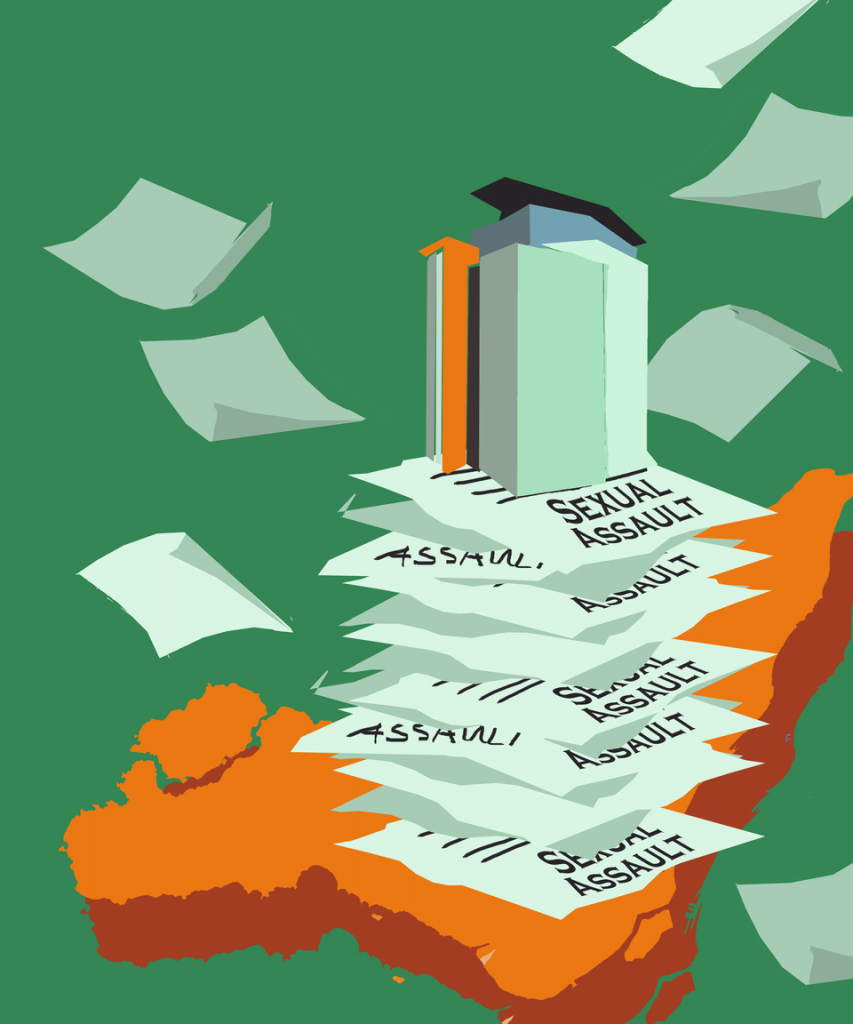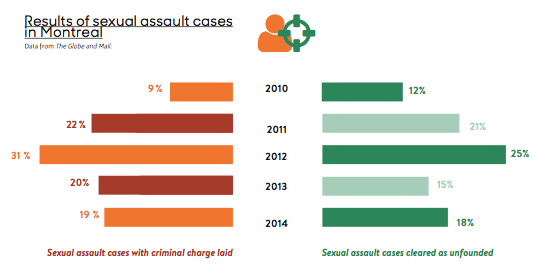Have Your Say survey aims to shed light on the way Concordia deals with sexual violence
The Concordia Student Union (CSU) and the Centre for Gender Advocacy (CGA) are creating a report based on results from a survey that sought student input on the way Concordia handles cases of sexual violence on campus. The report will be published this week and presented to Concordia University’s administration and the Quebec minister of education.
Before filling out the survey, students were invited to a “Have Your Say” event held on March 16, where they were informed about the consultations the Quebec government is hosting to examine sexual violence at the province’s universities and CEGEP. The consultations hosted by Higher Education Minister Hélène David were held in Montreal, Quebec City, Gatineau and Saguenay during the month of March.
Stacey Gomez, the action coordinator for the CGA, said the survey collected student feedback on how the Quebec government can respond to and prevent sexual violence on its university campuses.
“Our hope is to come up with a report that highlights student recommendations around how the campus can be a safer place, and how to better respond to sexual violence on campus,” Gomez said.
Lana Elinor Galbraith, the sustainability coordinator for the CSU and the person writing the report, said she hopes the report will encourage the university to create an actionable plan which will incorporate students’ suggestions.
In January, Galbraith attended a conference where student unions across Quebec were invited to discuss how different universities are handling matters of sexual assault. She was disappointed to learn that Concordia is one of the only universities that is relatively advanced. “We are the only ones that have a Sexual Assault Resource Centre (SARC) that’s paid for by the university and run by the university.” SARC offers support to students, faculty and staff who have been impacted by sexual harassment or assault.
Among the feedback gathered from the survey, Gomez said improving the services offered by the SARC was an important recommendation. “One of the things that came out of the Have Your Say event … was the need to have more resources for SARC and more staff,” Gomez said.
“For a long time, there was only one staff person for the entire campus. Now there are two,” she said, adding there is also a team of volunteers at the SARC.
“As we know, sexual violence on campus is a major issue, and so that’s not enough resources to be able to support students,” Gomez said.
In addition, Gomez said mandatory consent training was suggested for students at the university, particularly for those living in residence or involved in frosh.
“Many students mentioned that they did not feel supported by staff at the university, profs and also security,” Gomez said. She said the survey mentioned it would be beneficial for these parties to receive training on how to support survivors and address sexual violence. This would ensure that those in positions of power on campus “can be more understanding, more empathetic and more accommodating to students who are experiencing difficulties as a result of having experienced sexual violence,” Gomez said.

Fo Niemi, the co-founder and executive director of the Centre for Research-Action on Race Relations (CRARR), a small Montreal-based non-profit civil rights organization that has handled 15 cases involving students at Concordia, weighed in on how Concordia’s security often handles reports of sexual assault.
“One of the things that comes back often is that they complain security staff are usually trained to handle crowds, demonstrations, security concerns such as … or terrorism or emergencies, but not the aspect of what we call the human violence,” Niemi said.
According to Niemi, CRARR has been in contact with some women who have brought forth legal action against universities in Ontario and B.C. where they were assaulted or harassed.
“We’re not sure [if the way security handles complaints] has really been looked at in an objective manner or a more transparent manner, and I think that is the key thing,” Niemi said. “Some cases we’ve heard is that security, either they don’t know how to deal with it or sometimes they themselves may do something that could possibly put the victims or the survivors in a very uncomfortable position—even if they mean well,” Niemi said.
Jennifer Drummond, the coordinator of the SARC, said many individuals in positions of power at Concordia already receive training. “All different parts of the Concordia community receive training on [sexual assault awareness and bystander intervention], including the security department, upper administrators and the president’s executive group,” Drummond said. “Part of SARC’s education plan, as outlined in the Sexual Assault Working Group’s report recommendation, is to continue to expand the number of groups that receive these trainings—which will include faculty and staff in frontline positions.”
Drummond believes the university has taken the right strides in preventing and responding to sexual violence. “Implementing a sexual violence policy … and having a sexual assault centre with individuals able to accompany the survivor through both internal and external processes can encourage reporting and are evidence of an institution that takes this issue seriously,” Drummond said. “We see female, male and trans* survivors. There are some resources that we provide that are specific to male and trans survivors,” she added.
Drummond said these steps can encourage students to come forward about their experiences with sexual violence. However, many cases are dismissed, go undocumented and, therefore, don’t make it into larger databases about sexual assault.
“Research suggests that less than 10 per cent of sexual assaults are reported to police,” said Drummond. In addition, she said it can be expected within schools for there to be low numbers of reports, as survivors in institutions face various barriers in disclosing and reporting a case of sexual assault.
According to a 2015-2016 report released by Concordia, 16 complaints of sexual assault were made to the university during that year, with only three of these complaints resulting in a hearing or investigation. During the 2014-2015 school year, 16 complaints were made to the Office of Rights and Responsibilities under the category of “sexual harassment.” During this time, there was not a stand-alone policy specifically for sexual assault at Concordia. Instead, data of harassment and assault were both categorized under sexual harassment.
In a 20-month investigation into authorities’ management of sexual assault cases, conducted by The Globe and Mail, it was discovered that one in five sexual assault allegations in Canada are viewed as groundless, resulting in them being dismissed and unfounded—meaning the allegations were not taken seriously, leading the accusation being dismissed rather than documented. Once a case is dismissed, it is no longer considered a legitimate allegation, according to the report. In this investigation, it was revealed 19.39 per cent of cases in Canada are unfounded, almost twice as high as the rate for physical assault.
The Globe and Mail curated this information by filing 250 access to information requests with police services across the country and requested data from 1,100 jurisdictions. The investigation included responses from 873 jurisdictions, which accounts for 92 per cent of the Canadian population.
In Montreal, the same investigation revealed that, over a five year period, 1,256 out of 6,893 allegations—just over 18 per cent—were identified as unfounded.

The Sexual Assault Centre of the McGill Students’ Society (SACOMSS) launched a Sexual Assault Awareness Week on March 27. The week aims to raise awareness of sexual assault not only at McGill, but in the broader Montreal community, by hosting events and workshops between March 27 and 31.
While neither Concordia nor SARC host a sexual assault awareness week, university spokesperson Chris Mota said, “We see every day as an opportunity to raise awareness.” Mota added that SARC has upcoming events, including an open house on Wednesday, March 29. The SARC will also be holding an event on Thursday, April 13 to summarize the consultations held in Montreal by the Quebec government in March.
“Concordia was the first university in Canada to create the position of Sexual Harassment Advisor in 1987, and one of the first to adopt a policy on sexual harassment in the early 1990s,” Mota said.
“In 2013, Concordia launched the Sexual Assault Resource Centre to inform the campus community about consent, prevention and survivor support,” Mota said. “We felt it was an important step in supporting our community by providing services that specifically deal with sexual assault, given the issue of sexual assaults on campuses across Canada.”
Niemi said he has noticed some sexual violence cases at the university level may be prolonged or have unnecessary delays—there is the issue of the level of adequate support that is really given to the women. Niemi said he has not seen a difference in the way cases of sexual assault or harassment have been dealt with by the university since SARC has been implemented.
“For a student [body] of so many thousands of students with so much diversity [to] have only one person, Jennifer Drummond … She can be a superwoman, but she can’t address all of these things,” Niemi said. “They need at least three to four people in that office in addition to our support staff in order to work.”
SARC recently hired a service assistant and relocated for greater accessibility on campus. Fifteen people currently make up the SARC’s volunteer team.
When asked about expansion in terms of the team and the centre’s presence on campus, Drummond said, “SARC is still a very new service at Concordia and I expect, as time goes on, we will continue to expand our team and presence on campus.”




